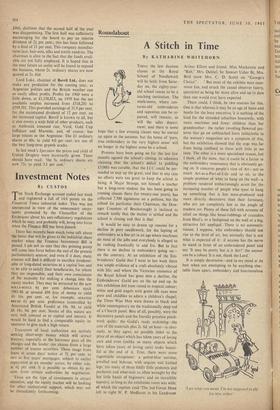Investment Notes
By CUSTOS
THE Stock Exchange account ended last week and registered a fall of 14.6 points on the Financial Times industrial index. This was not unexpected in view of the unnecessary uncer- tainty promoted by the Chancellor of the Exchequer about his anti-inflationary regulations which he may, and probably will, bring into force when the Finance Bill has been passed.
There has recently been much loose talk about the boost that will be given to'the industrial share market when the Trustees Investment Bill is passed. I am not so sure that this priming pump will come into force before the end of the present parliamentary session; and even if it does, many trustees will find it difficult to sacrifice irredeem- able or long-dated securities at a capital loss and to be able to satisfy their beneficiaries, for whom they are responsible, and their own consciences of the necessity for making a change into the equity market. They may be attracted by the new ROLLS-ROYCE 61 per cent. debenture stock 1981-86 at around £98 free of stamp to yield £6 16s. per cent. or, for example, AERATED BREAD 61 per cent. preference (controlled by Associated British Foods) at 18s. 9d. to yield £6 18s. 9d. per cent. Stocks of this nature are very well covered as to capital and interest. It would be hard to find a comparable equity in- vestment to give such a high return.
Treasurers of local authorities are actively seeking short-tew money which will attract trustees, especially as the borrower pays all the charges and the lender can choose from a large number of trustee securities. These range from loans at seven days' notice at 51 per cent. to two to five years' mortgages, subject to earlier repayment at six months' notice, by either side, at 6* per cent. It is possible to obtain 61- per cent. from certain authorities by negotiation.
These are the type of investments to attract attention, and the equity market will be looking for other institutional support, which may not be immediately forthcoming.


































 Previous page
Previous page